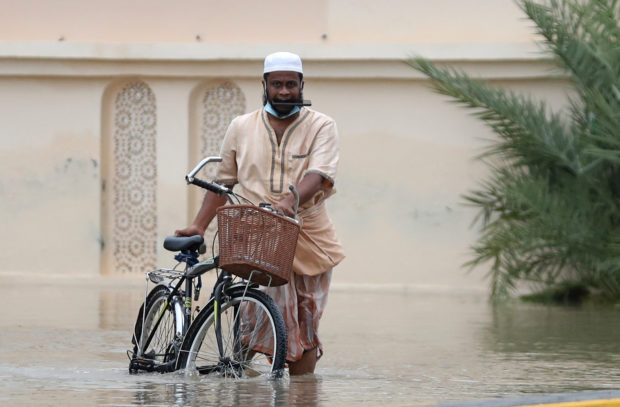
A man wades through a flooded street amid cyclone Shaheen in Oman’s capital Muscat on October 3, 2021. – Nine people were found dead in Oman and Iran as Tropical Cyclone Shaheen pummeled the two countries, authorities said. AFP
MUSCAT — At least nine people were killed in Oman and Iran on Sunday as tropical Cyclone Shaheen pummeled parts of their coastlines, authorities said.
In Oman, two people died in a landslide and a child in flash flooding, officials said.
Rescue teams pulled the bodies of two Asian workers from their home hit by a landslide in the Rusayl industrial area of Muscat province, Oman’s National Committee for Emergency Management (NCEM) said.
The child died and another person was reported missing in flash floods in the capital’s province, it added.
Flights were cancelled or delayed, as wind speeds reached 120 kilometers an hour across Oman’s north coast.
Shaheen was later downgraded to a tropical storm, said the NCEM.
In the capital Muscat, vehicles were tyre-deep in water and streets left semi-deserted.
Across the sea in Iran, six people were killed in Chabahar port in the southeastern province of Sistan-Baluchestan, parliament’s news agency ICANA reported, citing deputy speaker Ali Nikzad.
“Infrastructure, including electrical facilities and roads, was damaged,” provincial governor Hossein Modarres-Khiabani told Iran’s official IRNA news agency.
The eye of the storm was located 220 kilometers (130 miles) off the coast of the province, he said.
The United Arab Emirates (UAE) also went on “high alert”, emergency services said.
Some flights to and from Muscat International Airport were suspended as a precaution, while authorities urged people to avoid low-lying areas and valleys.
Oman declared a two-day national holiday on Sunday and Monday and shuttered schools, the official Oman News Agency said.
‘High alert in UAE’
In July, northern Oman was hit by heavy rains, hail and strong winds.
And in May 2018, Cyclone Mekunu hit southern Oman and the Yemeni island of Socotra, killing at least 11 people.
Oman, a country of some 4.6 million people, reopened its doors to foreign tourists last month after a Covid-imposed closure.
The Gulf country — known for its rich heritage, scenic coastline and stunning terrain — has been hit hard by the fall in world crude prices since 2014 and the coronavirus pandemic.
The sultanate had been counting on tourism to boost its flagging economy.
The UAE also braced for the storm, with emergency authorities urging people to avoid beaches and low-lying areas.
“We would like to assure everyone that the concerned authorities are on high alert and prepared to deal with any upcoming tropical situation,” its National Emergency Crisis and Disaster Management Authority said Saturday.
All construction work was suspended in Al-Ain, bordering Oman, and children were told to study remotely on Monday and Tuesday.